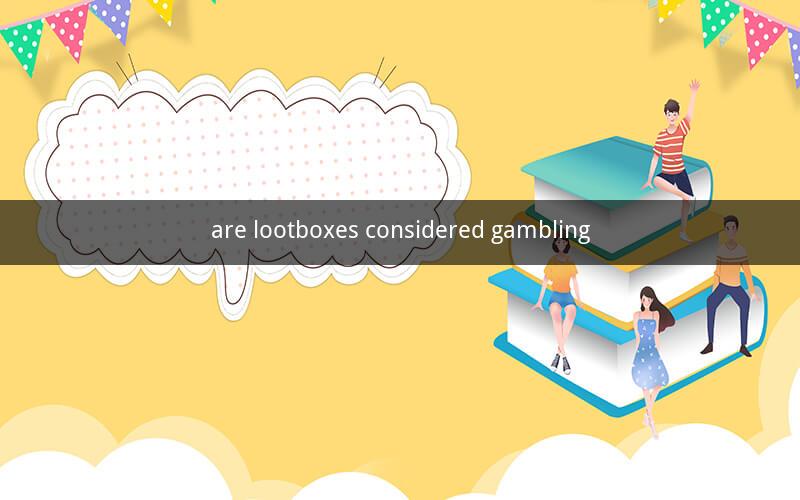
Table of Contents
1. Introduction to Loot Boxes
2. Definition of Gambling
3. The Debate on Loot Boxes as Gambling
4. Legal Perspectives on Loot Boxes
5. Psychological Aspects of Loot Boxes
6. The Impact of Loot Boxes on the Gaming Industry
7. Public Opinion and Social Concerns
8. The Role of Parental Controls and Regulation
9. The Future of Loot Boxes
10. Conclusion
1. Introduction to Loot Boxes
Loot boxes have become an integral part of the gaming industry, offering players the opportunity to obtain in-game items, characters, or skins through random chance. While many gamers appreciate the excitement and unpredictability that loot boxes bring, others argue that they resemble gambling and raise ethical and legal concerns.
2. Definition of Gambling
Gambling involves risking something of value on an event with an uncertain outcome, with the primary intent of winning money or material goods. It encompasses activities such as betting on sports, playing casino games, or engaging in lottery-style draws.
3. The Debate on Loot Boxes as Gambling
The debate on whether loot boxes should be considered gambling has gained significant attention. Proponents argue that the element of chance, along with the potential for financial loss, aligns loot boxes with gambling. Critics, on the other hand, contend that the primary purpose of loot boxes is to enhance gameplay and not to induce gambling behavior.
4. Legal Perspectives on Loot Boxes
Legal experts have varying opinions on whether loot boxes constitute gambling. Some argue that the element of chance and the potential financial loss make them akin to gambling, while others contend that the absence of real money betting and the voluntary nature of purchasing loot boxes distinguish them from traditional gambling activities.
5. Psychological Aspects of Loot Boxes
The psychological aspects of loot boxes are a subject of concern. Some argue that the thrill of opening a loot box and the potential for obtaining desirable items can trigger the same psychological mechanisms as gambling, such as the release of dopamine and the feeling of anticipation.
6. The Impact of Loot Boxes on the Gaming Industry
Loot boxes have had a significant impact on the gaming industry, both positively and negatively. On the positive side, they have generated substantial revenue for game developers and have been a source of excitement for players. However, concerns regarding addiction, loot box exploitation, and the potential for excessive spending have also emerged.
7. Public Opinion and Social Concerns
Public opinion on loot boxes varies widely. Some players and parents express concerns about the potential for addiction and the financial burden on young gamers. Others argue that loot boxes are a form of entertainment and that the responsibility lies with parents to monitor their children's spending.
8. The Role of Parental Controls and Regulation
Parental controls and regulations play a crucial role in addressing the concerns surrounding loot boxes. Many gaming platforms offer parental control options that allow parents to restrict access to loot boxes or limit spending. Additionally, governments and regulatory bodies have been exploring ways to regulate loot boxes and protect vulnerable individuals.
9. The Future of Loot Boxes
The future of loot boxes remains uncertain. As concerns regarding addiction and exploitation continue to grow, game developers and regulatory bodies may be forced to reevaluate their approach to loot boxes. Potential solutions include implementing more transparent systems, providing more information about the odds of obtaining specific items, and limiting the availability of loot boxes to adult players.
10. Conclusion
The debate on whether loot boxes should be considered gambling is complex and multifaceted. While some argue that the element of chance and potential for financial loss aligns loot boxes with gambling, others contend that their primary purpose is to enhance gameplay. As the gaming industry continues to evolve, it is crucial to address the concerns surrounding loot boxes and ensure that they are used responsibly.
Questions and Answers:
1. What is a loot box?
A loot box is a virtual container that randomly distributes in-game items, characters, or skins to players.
2. Are all loot boxes considered gambling?
No, not all loot boxes are considered gambling. The classification depends on various factors, including the presence of real money betting and the intent behind the loot box.
3. Can loot boxes be addictive?
Yes, loot boxes can be addictive due to the psychological mechanisms involved, such as the release of dopamine and the anticipation of obtaining desirable items.
4. Should parents be concerned about their children spending money on loot boxes?
Yes, parents should be concerned about their children spending money on loot boxes. It is important to monitor spending and provide guidance on responsible gaming habits.
5. Can loot boxes be regulated?
Yes, loot boxes can be regulated. Governments and regulatory bodies can implement measures to protect vulnerable individuals and ensure responsible use of loot boxes.
6. Are there any alternatives to loot boxes?
Yes, there are alternatives to loot boxes, such as direct purchases of in-game items or traditional item drops that do not involve random chance.
7. Can loot boxes be made more transparent?
Yes, loot boxes can be made more transparent by providing information about the odds of obtaining specific items and the potential value of the items within the loot box.
8. Should game developers be responsible for the impact of loot boxes on players?
Yes, game developers should be responsible for the impact of loot boxes on players. They should prioritize the well-being of their players and ensure that loot boxes are used responsibly.
9. Can loot boxes be addictive for adults?
Yes, loot boxes can be addictive for adults as well. The psychological mechanisms involved in loot boxes are not limited to a specific age group.
10. What is the future of loot boxes?
The future of loot boxes remains uncertain. As concerns regarding addiction and exploitation continue to grow, it is likely that regulations and changes will be implemented to address these concerns.